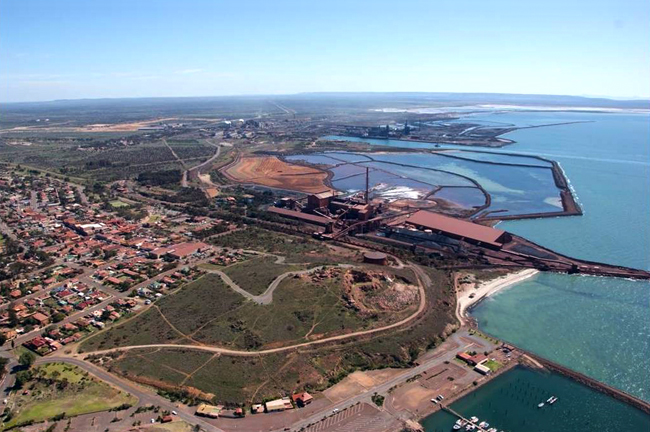An unlikely marriage between a UK steel baron and an Australian economist may be a turning point in Australia’s crippling energy wars

Whyalla township, steel mill and port. PHOTO Whyalla News
South Australia has always been our nation’s odd one out, ever since its first European settlement was founded on a no-convict principle. No other Australian colony was allowed that option.
True to its tradition of being different South Australia has now positioned itself as a leader in the struggle for clean energy – around half its electricity is now sourced from wind and solar – and a prime target in Australia’s crippling energy wars.
The state didn’t choose to be the butt of heavy Turnbull government criticism for its rapid renewable roll-out. But it seems to revel in the reputation of being at the leading edge of clean energy implementation, not just here but globally.
Tasmania remains the stand-out clean energy state, but except for a few recent wind-farms that reputation rests on a hydro system built last century. By contrast, South Australia’s wind-and-solar revolution is very much a 21st century phenomenon.
Last week, that revolution got a huge shot of adrenalin from a UK billionaire named Sanjeev Gupta. Weeks after formally taking over a distressed iron and steel business based at Whyalla, Gupta announced that he was a majority shareholder in Adelaide-based Zen Energy.
Sharing the stage with Gupta on that day was Zen Energy chairman Ross Garnaut, economics professor, Hawke government adviser, once an ambassador to China and author of a multi-year study that formed the basis of climate policies under Kevin Rudd and Julia Gillard.
There’s a practical side to Garnaut the academic. Having talked and written about clean energy for years, he’s putting effort and money into seeing what will work.
Garnaut’s past political connections and his climate work made him a polarising figure in this space well before he took up with Zen. His participation in a South Australian renewable energy business, given a shot in the arm by the Gupta deal, will do nothing to dispel that.
But what makes this deal really special is Sanjeev Gupta and what he brings to a renewables sector with a reputation, deserved or not, for lacking corporate and industrial muscle.
Former PM Tony Abbott told Radio 2GB last week that heavy industries needed coal or gas power. “You can’t run a steel plant on renewables,” he said. Gupta begs to differ.
Gupta built his fortune as a commodity trader under the name Liberty House, starting while he was still a student at Cambridge University in the early 1990s. He built a reputation for taking over distressed manufacturers, including his purchase of a steel mill in Newport, Wales, in 2013.
His approach to the Newport workforce was unexpected. Instead of sacking workers he employed a handful full-time as caretakers while all others he retained on half-pay, allowing them to take other jobs if they wished until renovations were completed.
That generosity won him the admiration and support of his workforce and their unions, a rare, even priceless asset for any new business, especially in traditional heavy industry. It was a tactic he has adopted again and again in multiple metal industry takeovers in the UK.
At Whyalla Gupta saw “a committed town, people who were not willing to give up… willing to make sacrifices”. In return for the new regime retaining all the remaining Whyalla workforce, workers have agreed to take a 10 per cent pay cut.
Gupta doesn’t seem to have heard the mantra that heavy industry and renewable energy don’t mix. He is steadily moving all his UK metal businesses into various renewable energy mixes including hydro, wind, solar, tidal and biodiesel using advanced demand management technology.
He is setting aside $1 billion to spend on infrastructure at the Whyalla mill and port and, importantly, its township and community. He will act as CEO during a 100-day analysis of the plant’s technology and efficiency.
Energy will be front and centre of that analysis. Garnaut, whose Zen team has spent years working on Whyalla’s energy needs, gave an interview last week on ABC radio in which he identified primary energy sources as wind and solar, both in plentiful supply at Whyalla.
As Coalition MPs keep reminding us, there are periods when wind and solar don’t contribute energy, and that means energy storage is critical at Whyalla. Zen’s battery expertise will be utilised, but the company is focusing on two other storage options.
One is pumped hydro. Excess wind and solar power will drive pumps to raise water from a disused open-cut pit in the iron-rich ranges behind Whyalla, up to a newly constructed dam where the water will drive hydro turbines when there’s no sun or wind.
Another option mentioned by Garnaut last week was cogeneration, by which electricity is produced from the Whyalla plant’s waste heat, gas and other materials. Cogeneration is well understood in the UK, where Gupta’s steel mills have made it a prominent part of their energy strategies.
Australian electricity today is the world’s most expensive, but for most of our history it’s been exceptionally cheap, and for that reason, says Garnaut, we’ve developed wasteful habits. Gupta and Garnaut aim to turn that around at Whyalla.
The Whyalla story will be fascinating to watch as it unfolds, given Gupta’s financial strength, Garnaut’s economic knowledge and Zen’s long-term work at Whyalla, all convinced that renewable power can drive heavy industry.
Nothing at the cutting-edge is ever smooth sailing, but this unlikely combination of steel baron and climate economist might just come up trumps. And if it turns out that Whyalla can manage without fossil fuels, why not the rest of us?
